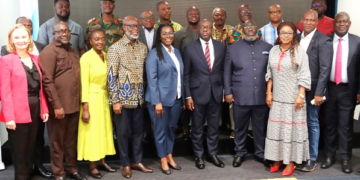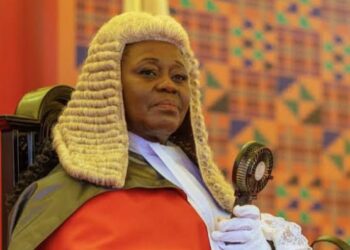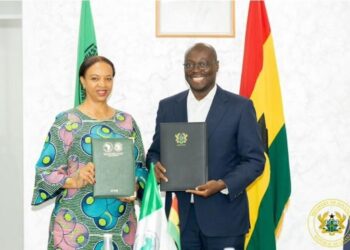A new radio technology, Digital Audio Broadcasting (DAB), that enables the transmission of digital audio content over the airwaves, has gone live in the country.
This makes the country the first in West Africa and fourth on the continent to embrace the innovative technology.
DAB brings in an era of radio broadcasting that will improve on the traditional Frequency Modulation (FM) by using digital signals instead of analogue, resulting in improved reception quality and reduced signal interference.
With increasing demand for sound broadcasting services and limited FM frequency availability in major cities, the country’s deployment of the latest version of DAB, the DAB+, will address frequency constraints for FM radio and allow stations to reach more cities while broadcasting the same radio content.
The regulator of the communication and telecommunication space, the National Communications Authority (NCA), has selected 18 radio stations, 11 from Accra and seven from Kumasi, to participate in the trial phase.
The trial is to test the DAB features, coverage characteristics and other technical metrics of DAB+ to inform frequency planning and regulatory standards.
It would also help to establish the quality aspects of DAB and transmission parameters which will deliver optimum quality and ascertain the issues that may emerge with multiple stations sharing the same infrastructure with a single transmission network provider, among other objectives.
Even though listening to DAB+ radio stations in the country will not require a subscription fee, it will need a compatible receiver or radio such as standalone DAB radios, DAB+ enabled car stereos, and even DAB+ functionality in select smartphones and portable devices.
The Minister of Communications and Digitalisation, Ursula Owusu-Ekuful, stated that with the rapid development of radio and television (TV) industry and its convergence with telecommunications, it had become necessary to ensure the quality of broadcasting services did not deteriorate.
As of the end of 2012, the NCA had authorised 707 FM stations, out of which 513 are operational.
Mrs Owusu-Ekuful said the global digital radio broadcast market was valued at over $3.7 billion in 2021 and was expected to expand at a growth rate of 11 per cent, reaching $6.9 billion by 2027.
“This provides an opportunity for Ghana to tap into this revenue stream to expand revenues for both the government and the private sector,” the minister said.
Mrs Owusu-Ekuful congratulated the NCA and the service providers on the work and ensuring that the country continued to blaze the trail in the telecommunication sector.
She, however, urged the regulator to expedite the rollout of the intervention “as this is a fast-changing industry and the NCA needs to be agile to respond quickly to the changing needs of the sector and the taste of the consumer”.
Mrs Owusu-Ekuful said the government was committed to empowering all agencies under the ministry to adapt to the ever-evolving technological landscape by adopting innovative strategies and approaches to their work.
“We are building the foundations of digital economy and working steadily to transform our economy through technology,” she stated.
The Minister of Information, Kojo Oppong Nkrumah, expressed the hope that the DAB would lead to the production of content that seeks to build the Ghanaian society and move the country forward.
He explained that communication was supposed to be used as a tool to showcase the country’s best and sell opportunities to attract partnerships.
Mr Oppong Nkrumah urged companies to take advantage of the new technology to create content that would promote entrepreneurship, financial technology (fintech), tourism, arts, entertainment, among others, to excite people to create more jobs and businesses to expand the economy.
The Director-General of NCA, Joe Anokye, said in order to ensure a successful assimilation, the authority had engaged household electronics dealers, car dealers and representatives of electronic manufacturers on DAB+ receiver standards so that they could begin to introduce quality DAB+ receivers in the Ghanaian market.
“It is evident that we need all of you stakeholders on board for this trial to be successful.
We need all broadcasting stations to promote the DAB+ service.
The NCA is doing its bit on behalf of the government, and we need all of you to contribute your part for a successful trial,” he stressed.
WorldDAB is the global umbrella of countries that have deployed DAB and its Project Director, Bernie O’Neill, stressed the enormous economic benefits that stations would derive from the new technology due to their ability to reach a larger audience, citing the UK’s 38 per cent increase in revenue over the last decade.
“The distribution cost for a single service on DAB is 80 per cent lower than on FM because of the multiple services on a single multiplex.
It means that the costs of distribution are shared,” she added.
She also described the DAB as environmentally friendly because it required significantly less energy, adding that it had been proven to be more resilient, especially during emergencies.
The Executive Secretary of the National Media Commission (NMC), George Sarpong, said the DAB would facilitate the democratisation of access to public communications because underserved and unserved communities would have the opportunity to be connected to a larger community.
“But for now, I think that it’s time to celebrate a major Ghanaian achievement in the field of innovation, leadership, foresight and national pride,” he added.

































